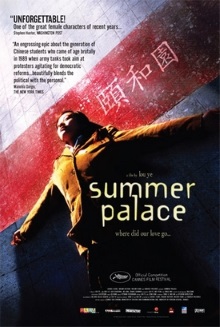
I didn’t plan for this as I had no idea what this film was about, but the anniversary of the Tiananmen Square protests turned out to be an appropriate time to watch Summer Palace. Director Lou Ye had impressed us with his recent Blind Massage and I believe I added this to our list as it is his most well known film. As to be expected for such a film, it was hugely controversial at the time, not only for its depiction of the protests and also for its sex scenes and its use of full frontal nudity for both male and female actors.
It’s the late 1980s so it’s still a huge event when a young woman from a small town is accepted at a prestigious university in Beijing. As Yu Hong has to leave behind her father and her boyfriend to do so, she seems initially overwhelmed by the bustle of the capital and feels lonely amidst the crowd. Another girl, Li Ti, in the same university notices her isolation however and befriends her. Through Li Ti’s circle of friends, Yu Hong meets the good-looking and somewhat intellectual Zhou Wei. Much of the film is focused on their tumultuous, on-again, off-again love affair. Meanwhile larger events roll on in the background and like everyone else the friends join in the Tiananmen protests. This proves to be the climax of their time at university. After that though Yu Hong is separated from her friends and has moved on to other lovers, she finds that she is unable to exorcise Zhou Wei from her heart.
Summer Palace can therefore be split into two distinct halves with the Tiananmen protests being the dividing point. The first half is essentially an account of university life in China during the late 1980s from the point of view of Yu Hong. This part is utterly fantastic and according to my wife, being someone who studied in university in China herself in the mid 1990s, eerily realistic. The crowded conditions of their dilapidated dorms, with clothes, books and cooking utensils strewn everywhere, force the students to intrude into each other’s lives, bringing both familiarity and contempt. Watching this, I was struck by the paradoxical sense that while each student has their thoughts and dreams, as we see in this film, there are so many of them that it feels like any particular individual don’t matter in the least. At the same time even while Yu Hong is waxing poetic about the intensity of her emotions and exploring her own sexuality, we see the students as a whole being swept away by their idealism and their collective sense of purpose. It’s a great juxtaposition and who can top the Tiananmen protests as the climax of a coming-of-age film?
Unfortunately as just the optimistic spirit of Tiananmen turned to ruin, the second half of the film is a disaster. In fact, I would even recommend skipping it entirely and pretend that the film ends after Yu Hong leaves university and her friends go to Germany. I suppose there’s some value in equating the pervasive sense of disappointment after the crackdown with the listlessness and lack of direction felt by Yu Hong’s circle of friends but most of the time, it feels like the director is more interested in emphasizing how much passion Yu Hong and Zhou Wei still feel for each other despite the distance between them, making this film veer dangerously close to sappy romance territory. It doesn’t help that the focus of the second part of the film expands to more people. We know too little about Li Ti and Zhou Wei to really care about what they are doing in Germany and why they are doing it. There is no solidity to these scenes, scattered about in time as they are and the director seems to reveal his own uncertainty by interweaving into them scenes of other protests around the world. These fall flat as the characters that we have come to know don’t seem to be overtly political. They join in because it’s what everyone else is doing and they are caught up in the moment. That’s a fine angle to take. But the director himself does care and the contrast doesn’t work at all.
Still, the first half of the film is so good that it’s well worth watching just for that. The portrayal of student life is full of details that I find utterly fascinating, such as how the students dance to American music from the 1960s and the 1970s. Why not 1980s pop music or Chinese pop music? I have no idea but my wife commented that the situation as similar when she was at school. The sex scenes are effective and resonant with emotion. I especially appreciated how they show that the Chinese students are just as interested in sex as Western ones even while the social norms are more conservative and so Yu Hong’s sexual exploits are heavily tinged with guilt. Most of all, the film captures the zeitgeist of the time, the feeling of tremendous potential and limitless possibilities on the eve of Tiananmen.